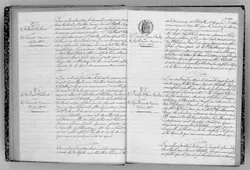
Marriage banns represent a tradition used in Christian denominations to announce a couple's intention to marry.[1] The proposed marriage is announced publicly at the church for a prescribed period of time, depending upon the church and denomination. The time period between the marriage banns and the actual wedding ceremony can be several weeks, allowing anyone to come forward with reasons why the marriage legally should not happen. Some practices including publicly reading the banns aloud for several Sundays leading up to the wedding, or posting them on the church door or in the church entryway. Marriage banns are no longer a common practice.
Research your ancestors on MyHeritage
Marriage banns practices by denominationMarriage banns practices by denomination
- Anglican/Episcopal Churches: In some countries, Anglican and Episcopal churches traditionally uses marriage banns as part of the process leading up to a wedding. The banns are read on three successive Sundays in the parish churches before the wedding can take place.
- Catholic Church: In the Catholic Church the Code of Canon Law outlines requirements for marriage banns or a similar announcement.
- Lutheran Churches: Some Lutheran denominations employ the use of marriage banns, with specific requirements and practices vary by country and specific church.
- Methodist Churches: As part of the marriage preparation process, publication of marriage banns may be practiced. Again, the traditions of the region and those of specific congregations set out the requirements.
- Reformed Churches: Certain denominations have historically required marriage banns and their public announcement prior to any legal wedding.
Civil marriage bannsCivil marriage banns
Prior to the standardization of recording marriages on a local or state level, some civil jurisdictions adopted practices very similar to marriage banns practices of churches. With the advent of civil jurisdictions requiring marriage licenses prior to a marriage ceremony, there was no longer a need to publicly announce a marriage.
Marriage banns informationMarriage banns information
Marriage banns records provide a wealth of information for genealogy research as well as clues for further research.
- Names of individuals to be married: marriage banns records list the names of those intending to marry.
- Names of parents: some marriage banns records will also list the names of parents for both individuals to be married.
- Location: usually marriage banns were made public in the home parishes of both individuals.
- Marriage date: a marriage banns won't include the date of the marriage ceremony, but it will help narrow down the timeframe for the ceremony. Check the marriage banns practices of the denomination or church to determine the typical period between announcement and marriage.
- F.A.N. Club: Besides listing names of witnesses or sponsors, some marriage banns records also recorded whether or not a previous marriage had occurred, as well as occupations of the individuals being married.
Locating marriage banns recordsLocating marriage banns records
Marriage banns records can be found online as well as by visiting archives and repositories in person.
- Online databases and genealogy websites: many of the major genealogy websites, including MyHeritage, offer several databases with church records including records of marriage banns. Most religious denominations do not offer online access to records; however, they may have licensed access to records via major genealogy websites.
- Church and denominational archives: access to church and denominational records is not consistent and depends upon both the church and denomination. The best approach is to call or write to the church where an ancestor worshipped and ask for information on access to marriage banns records. Some denominations maintain regional and national archives and libraries and may require a visit to those repositories in order to access records. Again, always call before making a visit to understand hours of operation, fees, and any possible restrictions to records.
See alsoSee also
References
- ↑ Herbermann, Charles, ed. (1913). "Banns of Marriage". Catholic Encyclopedia. New York: Robert Appleton Company

